The Moravian Music Foundation preserves, shares, and celebrates Moravian musical culture.
You know the story – how, in April of 1783, with the signing of the Treaty of Paris in January to end the American Revolutionary War, Governor Alexander Martin declared that 4 July should be celebrated throughout the state of North Carolina as a “day of solemn thanksgiving”. The Moravian towns in Wachovia all celebrated the day in various ways, which included church services, lovefeasts, prayers, instrumental music, hymns of thanksgiving, and ringing of bells. Salem, the largest Moravian community and home of the central administration of the Moravians’ 100,000-acre Wachovia tract, had the most extensive celebration, and the Salem Diary for Friday, July 4, 1783, described it well, reading in part:
According to the order of the government of this State we celebrated a day of thanksgiving for the restoration of peace. The congregation was awakened by the trombonists. At the beginning of the preaching service the Te Deum was sung… At two o’clock there was a happy Lovefeast, during which a Psalm of Joy was sung with thankful hearts…In the evening…the congregation again assembled in the Saal, and the choir sang…Then the congregation formed a circle in front of the Gemein Haus, and from there passed in procession through the main street of town, with music and the antiphonal song of two choirs…Hearts were filled with the peace of God, evident during the entire day and especially during the procession, and all around there was silence, even the wind being still.
Since the governor’s proclamation only reached Salem at the end of June 1783, there was no time to compose and learn new music. Thus the music for the lovefeast, the “Psalm of Joy”, was taken in large part from the music used by the Moravians in Germany to celebrate the conclusion of the Seven Years’ War in 1763.
Knowing what we know about the Moravians, it should not be a surprise to us that, as we peruse the texts of the Psalm of Joy, we find no resounding victory celebration; there’s no cheering that “we won”; rather, there is only thanksgiving that, after fiery trials, “peace is with us”. We do not find hymns or anthems that are noticeably patriotic in tone. We do not here invoke God’s blessing on America as if we are particularly deserving, or as if our system of government were divinely ordained and closer to the reign of God than other systems might be. Rather, the texts claim a relationship to God the Creator, Christ as Redeemer, and the Holy Spirit as one who sustains and teaches. The Psalm of Joy affirms that God is the shelter from the stormy blast, that peace comes from Christ’s work of salvation, and that the Lord provides strength for our living today.
Does this mean that the Moravians thought (or even think today) that, just because one follows Jesus, one will have a happy life and won’t ever be under threat of war, storm, devastation, or violence of any kind? Not at all! We all know better than that, and if we read the stories of the first followers of Christ or our own Moravian history, we certainly know better than that. If our Lord himself suffered a violent and shameful death, why should we expect to be spared suffering as we seek to follow him? And yet, God promises, “Peace I give unto you. Do not let your hearts be troubled, and do not let them be afraid.” (John 14: 27) What, then, is that “peace”?
According to the Moravians of years past, peace is not just a political thing; nor is it only a personal state of being. It’s both. Peace begins in each individual heart, and moves outward in ever-widening circles. If one is not at peace with one’s own self, the best one can hope for is an uneasy cease-fire with the neighbor, not a true peace. And until one’s heart finds its peace in God, one will not be at rest, at peace, within. Peace is God’s gift, God’s miracle, and it is more than the absence of armed conflict.
Composer and music director Johann Friedrich Peter (1746–1813), responsible for taking the materials at hand to craft the Psalm of Joy, was one of the most prolific composers of Moravian choral music. Educated in Holland and Germany, he came to American in 1770 and was sent to Salem, NC, in 1780. Peter established a very strong musical tradition in Salem, and was the composer and copyist for many of the works found in the Salem Congregation Collection. Peter was also no stranger to instrumental music, and his string quintets, dated 1789, are the earliest-known chamber music written in America. His musical impact on Salem was so great that when he was sent to Bethlehem, PA, in the 1790s it took five people just to fill his musical role in the settlement (additional people had to take on his many administrative duties). Peter died in Bethlehem, Pennsylvania, on July 13, 1813, shortly after playing for a children’s service.
The Moramus Chorale will perform the Psalm of Joy on Sunday, June 30, 2019 at 4:00 p.m. at King Moravian Church. Admission is free.
Next time: A special mid-summer night’s dream??
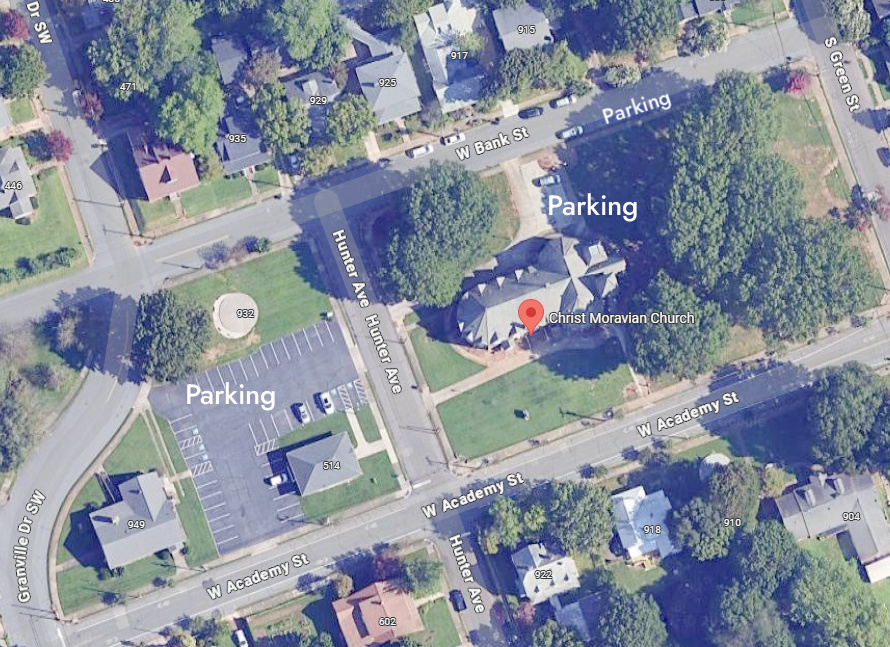
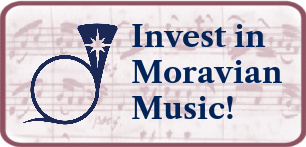

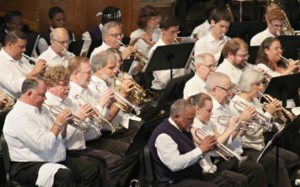
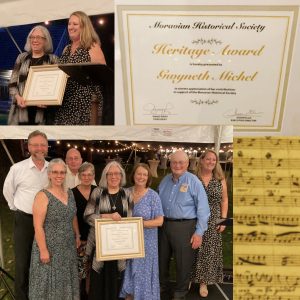
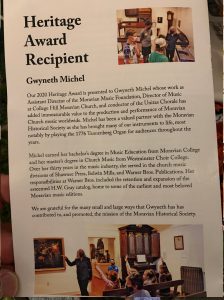
Very applicable today: “Does this mean that the Moravians thought (or even think today) that, just because one follows Jesus, one will have a happy life and won’t ever be under threat of war, storm, devastation, or violence of any kind?”